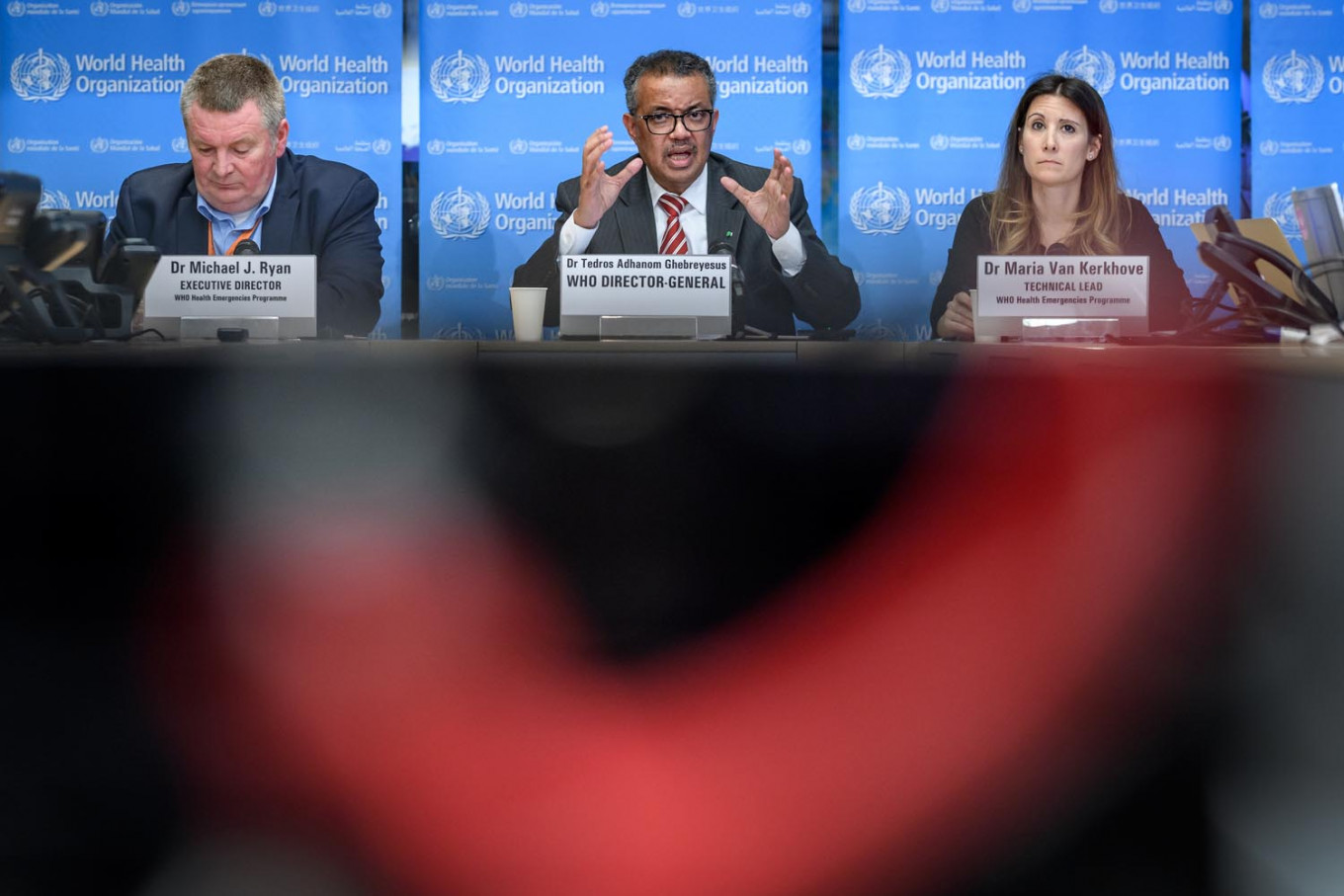Popular Reads
Top Results
Can't find what you're looking for?
View all search resultsPopular Reads
Top Results
Can't find what you're looking for?
View all search resultsWHO calls for 'aggressive measures' against COVID-19 amid surge in South, East Asia region
Change text size
Gift Premium Articles
to Anyone
 World Health Organization (WHO) health emergencies programme director Michael Ryan (left), WHO director-general Tedros Adhanom Ghebreyesus (center) and WHO technical lead Maria Van Kerkhove attend a daily press briefing on COVID-19, the disease caused by the novel coronavirus, at the WHO heardquaters in Geneva on March 11. Ghebreyesus announced on March 11 that the new coronavirus outbreak could be characterized as a pandemic. (AFP/Fabrice Coffrini)
World Health Organization (WHO) health emergencies programme director Michael Ryan (left), WHO director-general Tedros Adhanom Ghebreyesus (center) and WHO technical lead Maria Van Kerkhove attend a daily press briefing on COVID-19, the disease caused by the novel coronavirus, at the WHO heardquaters in Geneva on March 11. Ghebreyesus announced on March 11 that the new coronavirus outbreak could be characterized as a pandemic. (AFP/Fabrice Coffrini)
T
he World Health Organization (WHO) has called on member states in the South-East Asia region to urgently take “aggressive measures” to combat COVID-19 in view of the significant spike in the number of cases in the region.
“The situation is evolving rapidly. We need to immediately scale up all efforts to prevent the virus from infecting more people,” said WHO regional director for the South-East Asia region Poonam Khetrapal Singh in a statement on Tuesday.
The WHO’s South-East Asia region has 11 member states, namely Bangladesh, Bhutan, North Korea, India, Indonesia, the Maldives, Myanmar, Nepal, Sri Lanka, Thailand and Timor-Leste.
Eight of the 11 countries in the region have confirmed cases of COVID-19, with 172 cases in Indonesia, 147 in Thailand, 137 in India, 29 in Sri Lanka, 13 in the Maldives, eight in Bangladesh, one in Bhutan and one in Nepal as of Tuesday. These numbers are increasing quickly.
“More clusters of virus transmission are being confirmed. While this is an indication of alertness and effective surveillance, it also puts the spotlight on the need for more aggressive and whole of societal efforts to prevent further spread of COVID-19. We clearly need to do more, and urgently,” Singh said.
Looking at the numbers, some countries are clearly heading toward community transmission of COVID-19, the regional director said, adding this should be prevented as best as possible. It was necessary to ensure continued efforts to detect, test, treat, isolate and trace contacts as simple public health measures were critical, he said.
The importance of hand hygiene, covering coughs and sneezes and practicing social distancing could not be emphasized enough, Singh added.
“This alone has the potential to substantially reduce transmission.”
However, if community transmission does set in, countries need to gear their responses toward slowing down the rate of transmission.
Emergency mechanisms need to be scaled up. A network of health facilities and hospitals for triage and surge need to be activated to avoid overcrowding. Self-initiated isolation by people with mild diseases is the most important community intervention to reduce the burden on the health system and reduce virus transmission.
Testing of all suspected cases and symptomatic contacts of probable and confirmed cases is also necessary.
“We need to be geared up to respond to the evolving situation with the aim of stopping transmission of COVID-19 at the earliest to minimize the impact of the virus, which has gripped more than 150 countries in a short span of time, causing substantial losses to the health of people, societies, countries and economies. Urgent and aggressive measures are the need of the hour. We need to act now,” Singh concluded.
In its daily report on Tuesday, the WHO reported that 179,112 cases had been confirmed globally, resulting in 7,426 deaths.
The Western Pacific region has 91,779 confirmed cases with 289 new, the European region has 64,189 confirmed cases with 8,507 new, the South-East Asia region has 508 confirmed cases with 124 new and the Eastern Mediterranean region has 16,786 confirmed cases with 330 new.
Meanwhile, the Americas have recorded 4,910 cases with 2,234 new and the African region has 228 cases with 42 new.
Globally, the WHO assessed the risk situation level as “very high” as of Tuesday.
Meanwhile, early on Wednesday, realtime data from the Johns Hopkins University's Center for Systems Science and Engineering (CSSE) had recorded 198,004 confirmed COVID-19 cases, with 7948 deaths. Of the total, 81,947 have recovered.






